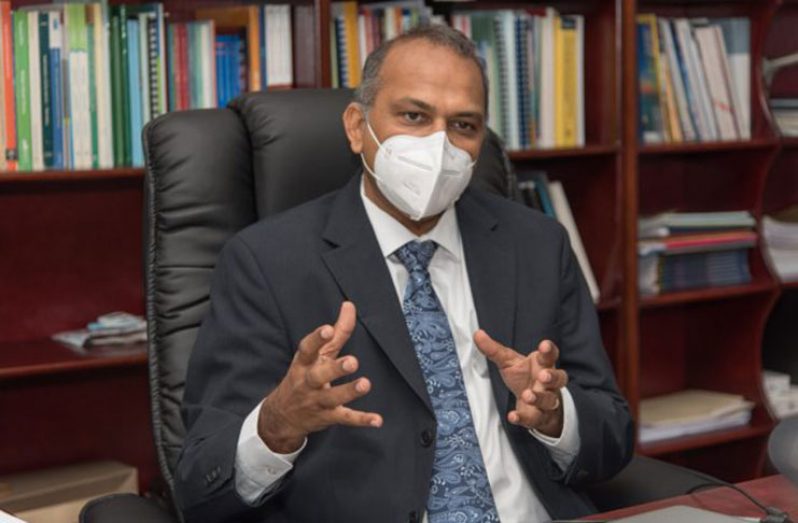— Dr. Anthony says very difficult for COVID-19 cases to ‘slip through’
By Navendra Seoraj
GUYANA’S international airports are scheduled to reopen in a matter of days and local authorities are confident that they have created systems to minimise the possibility of a case of the novel coronavirus (COVID-19) coming into the country, and have even equipped facilities to deal with any eventualities.
With no approved cure or special treatment for COVID-19, authorities are depending heavily on preventative measures to stop the spread of this disease, measures which will be enforced when the airports reopen on October 12, 2020.
The emergency measures were made pursuant to paragraphs (1) and (2)(b) of the Direction by the President, given under the Public Health Ordinance, Cap. 145, and published in the Gazette, Legal Supplement –B, March 16, 2020.
According to health authorities, the COVID-19 Emergency Measures (No. 8) will expire on October 31, 2020, unless earlier terminated, extended or amended by notice of the Minister of Health, after an assessment of the prevailing public health conditions.
Though there is expected to be “rigid enforcement” of those measures, authorities are prepared for eventualities and facilities are well-equipped to deal with same.
“… We have enough capacity to quarantine people if it is necessary,” said Minister of Health, Dr. Frank Anthony, in an invited comment on Friday.
Authorities have been using several facilities to quarantine persons who have tested positive for, or are suspected to have, COVID-19. Recent statistics show that there are 115 persons in institutional isolation while 948 persons are in home isolation.
The Guyana Chronicle was reliably informed that facilities such as the Diamond Hospital and the Infectious Diseases Hospital (Ocean View facility) are among some of the places which will be used to quarantine/isolate persons who may test positive after arriving in Guyana.
STRINGENT SYSTEMS
Although facilities are equipped to handle such instances, Dr. Anthony was confident that it would not reach that far, as stringent systems and protocols have been established to minimise the possibility of cases entering Guyana.
“Preparation is good… we have thought out the system so nobody is going to come to Guyana without a negative PCR (Polymerase chain reaction) test… so that’s the first thing that people need to understand.
“Not because the airport is open you can jump on a plane and come here. No, before you can even get on the flight you are required to have a PCR test at the point of origin. That test would have to be sent to us here in Guyana for us to validate it, and once we are satisfied then we allow the airline to put you on the flight,” said the Health Minister.
If the PCR test was done within 72 hours of arrival, persons would be allowed to go to their destination in Guyana, but once it goes over that time, travellers will have to undergo a second PCR test at the airport.
“Once you complete that test at the airport, you will have to wait for your results before we allow you to proceed… so in that way it is going to be very difficult for somebody who is infectious to get past the system that we have set up,” said a confident Dr. Anthony.
When asked what would happen to other passengers if someone from the flight tests positive here, the minister said authorities will work according to World Health Organisation (WHO) guidelines which stipulate that the persons sitting in front, at the side(s) and behind the infected person(s) would have to be tested.
MORE STAFF
Those persons will be quarantined until the results are produced, said Dr. Anthony, adding that every person will be treated the same and will have to abide by the protocols. To aid in this process, authorities have deployed more health workers to the various ports of entry.
All stakeholders who flout those measures will be held accountable and even be penalised for their actions, said Director-General of the Guyana Civil Aviation Authority (GCAA), Lt. Col. (ret’d) Egbert Field, during a recent interview with the Guyana Chronicle.
“We will be enforcing it [the measures] rigidly, because we do not intend to have aviation tarnish the health of individuals… so we will be playing our part and we expect aircraft operators, airports, aircraft handlers and travellers to play their part in ensuring measures are strictly adhered to,” said Field.
Speaking about the role of airlines, the director-general said carriers will have to ensure that passengers adhere to measures which include wearing a mask, social distancing and sanitising. Also, companies would have to ensure that their aircraft are sanitised between flights, and that all regulations which have been gazetted are adhered to.
“All of this is being done so we could not just have a reopening of the airports, but a successful reopening… we do not just want to be opening the doors wide without strict measures and penalties… yes, there are penalties for non-adherence and non-compliance, and they will be rigidly enforced,” said Field.
Authorities recently conducted a “walkthrough” at the airports and observed that there are adequate sanitisation materials, social-distancing markings and measures to keep employees of those facilities protected at all times.



.jpg)









